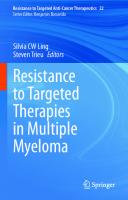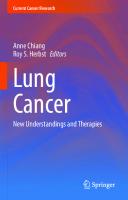Targeted Therapies in Lung Cancer: Management Strategies for Nurses and Practitioners [1 ed.] 9783030165505, 3030165507
412 114 2MB
English Pages [122] Year 2019
Table of contents :
Contents
1: Introduction
References
2: Introduction to Mutation Testing
2.1 Introduction/Lung Cancer Statistics/Histology
2.2 Types of Lung Cancer Mutations
2.2.1 EGFR
2.2.2 ALK
2.2.3 ROS1
2.2.4 BRAF
2.2.5 KRAS
2.2.6 ERBB2 (HER2)
2.2.7 MET
2.2.8 NTRK
2.2.9 Other
2.3 Mechanism of Resistant Mutations
2.4 Patient Selection for Molecular Testing
2.5 Role of Nursing and Advanced Practice Providers (APP) and Team Approach to Molecular Testing
References
3: Nursing Considerations with EGFR Inhibitors in NSCLC
3.1 The Epidermal Growth Factor Receptor Mutation
3.1.1 The EGFR Inhibitors
3.2 Toxicities of EGFR Inhibitors
References
4: Nursing Considerations with ALK and ROS1 Inhibitors in NSCLC
4.1 Introduction
4.2 ALK Positive NSCLC
4.2.1 Crizotinib
4.2.2 Ceritinib
4.2.3 Alectinib
4.2.4 Brigatinib
4.2.5 Lorlatinib
4.3 ROS1 Positive NSCLC
4.3.1 Crizotinib
4.3.2 Other Treatments
4.4 Toxicities and Management of ALK/ROS1 Inhibitors
4.4.1 Pneumonitis
4.4.2 Fatigue
4.4.3 Visual Disturbances
4.4.4 GI Toxicities
4.4.5 Cardiovascular Toxicities
4.4.6 Laboratory Abnormalities
4.4.7 Other
4.5 Conclusions
References
5: BRAF in NSCLC
5.1 Overview and Mechanism of Action of BRAF Mutations in NSCLC
5.2 Data for BRAF
5.3 Toxicities and Management
5.3.1 Previously Treated Patients
5.3.2 Melanoma Patients
5.3.3 Pyrexia
5.3.4 Cutaneous Skin Reactions
5.3.5 Hypertension
5.3.6 LVEF
5.3.7 QTc Prolongation
5.3.8 Ocular Toxicities
5.4 Conclusion
References
6: Mechanisms of Acquired Resistance to Targeted Therapy in NSCLC: Role of Repeat Biopsy and Nursing Considerations
6.1 Background
6.2 Utility of Repeat Biopsy: Tissue Testing
6.3 Utility of Repeat Biopsy: Liquid Biopsy
6.4 Mechanisms of Acquired Resistance
6.4.1 EGFR Acquired Resistance Mutations
6.4.1.1 Primary Resistance
6.4.1.2 Acquired Resistance
6.4.1.3 Secondary Resistance
6.4.1.4 Tertiary Resistance
6.4.2 ALK Acquired Resistance Mutations
6.5 Summary
References
7: The Impact and Toxicity of Checkpoint Inhibitors in Management of Lung Cancer
7.1 Introduction
7.1.1 Immune Checkpoint Inhibitor Agents
7.2 Mechanism of Action
7.3 Patient Selection
7.4 Results of Clinical Trials
7.4.1 Metastatic Disease: First-Line Therapy
7.4.1.1 Pembrolizumab Monotherapy
7.4.1.2 Pembrolizumab Plus Chemotherapy
7.4.1.3 Atezolizumab Plus Chemotherapy
7.4.2 Metastatic Disease: Second-Line Monotherapy
7.4.2.1 Combination Checkpoint Inhibitors
7.4.2.2 Combinations with Radiation
7.4.2.3 Consolidation Therapy
7.4.2.4 Small Cell Lung Cancer
7.4.2.5 Mesothelioma: Second and Third Line
7.5 Management of Immune-Related Adverse Events
7.5.1 Management of Select irAEs
7.5.1.1 Pneumonitis
7.5.1.2 Colitis
7.5.1.3 Dermatitis
7.5.1.4 Hepatitis
7.5.1.5 Endocrinopathies
7.6 Patient Education
7.7 Supportive Care
7.8 Future Developments
References
8: The Role of Anti-Angiogenic Agents (VEGF)
8.1 Angiogenesis
8.2 Tumor Angiogenesis
8.3 Vascular Endothelial Growth Factor (VEGF)
8.4 Anti-Angiogenesis
8.5 Bevacizumab
8.6 Bevacizumab Toxicities
8.6.1 Hypertension
8.6.2 Reversible Posterior Leukoencephalopathy Syndrome (RPLS)
8.6.3 Proteinuria
8.6.4 Thromboembolism
8.6.5 GI Perforation (GIP)
8.6.6 Hemorrhage
8.7 Ramucirumab
8.8 Toxicities
8.9 Ramucirumab Administration, Precautions, and Monitoring Parameters
8.10 Nursing Management of Common Adverse Effects
8.10.1 Hypertension
8.10.2 Proteinuria
8.10.3 Epistaxis and Hemoptysis
8.11 Conclusion
References
9: Nursing Considerations for Patients Treated with Targeted Therapies
9.1 Preparing Patients for Treatment on Targeted Therapies: Nursing Considerations
9.1.1 Access to Therapy
9.1.2 Education
9.2 Treatment Initiation and Monitoring
9.2.1 Nursing Assessment
9.2.2 Telephone Triage
9.2.3 Adherence
9.2.4 Multidisciplinary Approach
9.3 Summary
References
Contents
1: Introduction
References
2: Introduction to Mutation Testing
2.1 Introduction/Lung Cancer Statistics/Histology
2.2 Types of Lung Cancer Mutations
2.2.1 EGFR
2.2.2 ALK
2.2.3 ROS1
2.2.4 BRAF
2.2.5 KRAS
2.2.6 ERBB2 (HER2)
2.2.7 MET
2.2.8 NTRK
2.2.9 Other
2.3 Mechanism of Resistant Mutations
2.4 Patient Selection for Molecular Testing
2.5 Role of Nursing and Advanced Practice Providers (APP) and Team Approach to Molecular Testing
References
3: Nursing Considerations with EGFR Inhibitors in NSCLC
3.1 The Epidermal Growth Factor Receptor Mutation
3.1.1 The EGFR Inhibitors
3.2 Toxicities of EGFR Inhibitors
References
4: Nursing Considerations with ALK and ROS1 Inhibitors in NSCLC
4.1 Introduction
4.2 ALK Positive NSCLC
4.2.1 Crizotinib
4.2.2 Ceritinib
4.2.3 Alectinib
4.2.4 Brigatinib
4.2.5 Lorlatinib
4.3 ROS1 Positive NSCLC
4.3.1 Crizotinib
4.3.2 Other Treatments
4.4 Toxicities and Management of ALK/ROS1 Inhibitors
4.4.1 Pneumonitis
4.4.2 Fatigue
4.4.3 Visual Disturbances
4.4.4 GI Toxicities
4.4.5 Cardiovascular Toxicities
4.4.6 Laboratory Abnormalities
4.4.7 Other
4.5 Conclusions
References
5: BRAF in NSCLC
5.1 Overview and Mechanism of Action of BRAF Mutations in NSCLC
5.2 Data for BRAF
5.3 Toxicities and Management
5.3.1 Previously Treated Patients
5.3.2 Melanoma Patients
5.3.3 Pyrexia
5.3.4 Cutaneous Skin Reactions
5.3.5 Hypertension
5.3.6 LVEF
5.3.7 QTc Prolongation
5.3.8 Ocular Toxicities
5.4 Conclusion
References
6: Mechanisms of Acquired Resistance to Targeted Therapy in NSCLC: Role of Repeat Biopsy and Nursing Considerations
6.1 Background
6.2 Utility of Repeat Biopsy: Tissue Testing
6.3 Utility of Repeat Biopsy: Liquid Biopsy
6.4 Mechanisms of Acquired Resistance
6.4.1 EGFR Acquired Resistance Mutations
6.4.1.1 Primary Resistance
6.4.1.2 Acquired Resistance
6.4.1.3 Secondary Resistance
6.4.1.4 Tertiary Resistance
6.4.2 ALK Acquired Resistance Mutations
6.5 Summary
References
7: The Impact and Toxicity of Checkpoint Inhibitors in Management of Lung Cancer
7.1 Introduction
7.1.1 Immune Checkpoint Inhibitor Agents
7.2 Mechanism of Action
7.3 Patient Selection
7.4 Results of Clinical Trials
7.4.1 Metastatic Disease: First-Line Therapy
7.4.1.1 Pembrolizumab Monotherapy
7.4.1.2 Pembrolizumab Plus Chemotherapy
7.4.1.3 Atezolizumab Plus Chemotherapy
7.4.2 Metastatic Disease: Second-Line Monotherapy
7.4.2.1 Combination Checkpoint Inhibitors
7.4.2.2 Combinations with Radiation
7.4.2.3 Consolidation Therapy
7.4.2.4 Small Cell Lung Cancer
7.4.2.5 Mesothelioma: Second and Third Line
7.5 Management of Immune-Related Adverse Events
7.5.1 Management of Select irAEs
7.5.1.1 Pneumonitis
7.5.1.2 Colitis
7.5.1.3 Dermatitis
7.5.1.4 Hepatitis
7.5.1.5 Endocrinopathies
7.6 Patient Education
7.7 Supportive Care
7.8 Future Developments
References
8: The Role of Anti-Angiogenic Agents (VEGF)
8.1 Angiogenesis
8.2 Tumor Angiogenesis
8.3 Vascular Endothelial Growth Factor (VEGF)
8.4 Anti-Angiogenesis
8.5 Bevacizumab
8.6 Bevacizumab Toxicities
8.6.1 Hypertension
8.6.2 Reversible Posterior Leukoencephalopathy Syndrome (RPLS)
8.6.3 Proteinuria
8.6.4 Thromboembolism
8.6.5 GI Perforation (GIP)
8.6.6 Hemorrhage
8.7 Ramucirumab
8.8 Toxicities
8.9 Ramucirumab Administration, Precautions, and Monitoring Parameters
8.10 Nursing Management of Common Adverse Effects
8.10.1 Hypertension
8.10.2 Proteinuria
8.10.3 Epistaxis and Hemoptysis
8.11 Conclusion
References
9: Nursing Considerations for Patients Treated with Targeted Therapies
9.1 Preparing Patients for Treatment on Targeted Therapies: Nursing Considerations
9.1.1 Access to Therapy
9.1.2 Education
9.2 Treatment Initiation and Monitoring
9.2.1 Nursing Assessment
9.2.2 Telephone Triage
9.2.3 Adherence
9.2.4 Multidisciplinary Approach
9.3 Summary
References
![Targeted Therapies in Lung Cancer: Management Strategies for Nurses and Practitioners [1 ed.]
9783030165505, 3030165507](https://ebin.pub/img/200x200/targeted-therapies-in-lung-cancer-management-strategies-for-nurses-and-practitioners-1nbsped-9783030165505-3030165507.jpg)




![Cancer Prevention and Nutritional Therapies ( Cancer and its Nutritional Therapies by Richard Passwater ) [Revised]
0879836075, 9780879836078](https://ebin.pub/img/200x200/cancer-prevention-and-nutritional-therapies-cancer-and-its-nutritional-therapies-by-richard-passwater-revised-0879836075-9780879836078.jpg)




